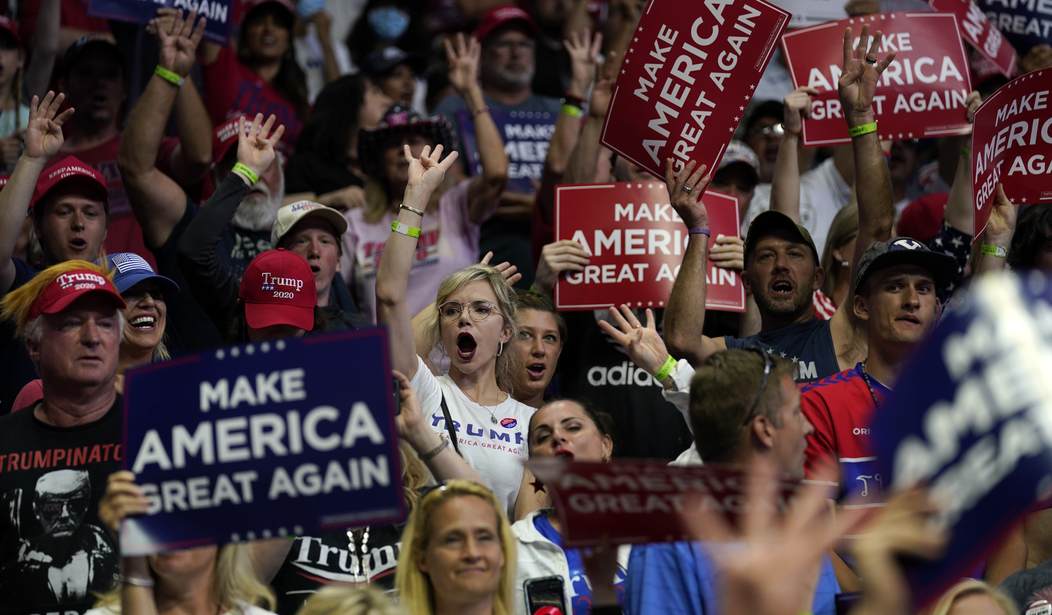The Wall Street Journal reported that President Donald Trump had talked to aides about the idea of starting a new political party. His urge is understandable. Considering the events that have transpired since the January 6th riots and some Republicans voting to impeach him, emotions are high. Minority Leader Mitch McConnell’s floor speech was rather shocking as well as disappointing. Even more so in light of additional information that the Capitol’s breach was planned in advance, not a result of Trump’s comments that day. That really weakens any incitement charge.
However, I would ask President Trump to pause for a moment and reflect on a few things. First, he should think about his impressive list of accomplishments. On many of those items, he had near-unanimous Republican support. During his tenure, we also got rid of some of the squishier Republicans. Jeff Flake comes to mind.
Some Republicans seemed to stiffen their spines and realize that their Democratic colleagues were playing a different game. Senator John Kennedy (R-La.) and Senator Lindsey Graham (R-S.C.) certainly did during the Kavanaugh hearings. It seems Senator Rubio has had some real change of heart on immigration. Many others have changed their views on unabated free trade that disadvantages America, especially with China. We’ll see if those changes are durable as “Cocaine Mitch” disappeared shortly after the election to become second-fiddle in the Uniparty again.
In short, since the Tea Party started in 2010, the Republican Party has been changing. As a result, there is realignment going on in the electorate. Republicans are no longer the party of big business and will have to learn not to reflexively prioritize free trade and free markets at all costs. President Trump started to build a new base of Republican voters. Author and political consultant Brad Todd said this after the election:
Democrats always argued, “If more people voted, we would win.” Well, guess what? Everybody voted, and it didn’t help the Democrats. There is a multi-racial, working-class ethos that is animating the new Republican coalition.
Justin Gest, an author and political scientist from George Mason University, added:
Democrats need to ask themselves why someone like Joe Biden is an endangered species in the party. Why is the party of experts, urban intellectuals and woke social-movement activists not producing candidates who can mobilize people in Montana, Ohio, North Carolina? It just doesn’t look like a national party.
We need to build on the coalition that Todd identified and communicate that “lunch bucket Joe” is a dying breed among Democrats. President Trump’s base needs to become one of the new factions that strikes a deal within the Republican Party to build a new coalition. The Reagan-Buckley coalition is no longer going to win elections, nor will a candidate like Mitt Romney. I believe GOP Chairwoman Ronna McDaniel has the skills to build this new coalition. Still, she will need someone with President Trump’s uncanny authenticity and ability to appeal to the working and middle classes to help.
The Tea Party started the transformation of the Republican Party using many of the same tactics the Justice Democrats used. This strategy was actually first expressed by an old socialist, Michael Harrington. Because America has a two-party system, he said you couldn’t start a new party; you have to transform an old party. And you pick the one closest to the target.
Harrington looked a little rough here in 1988. However, he was a public intellectual who debated the likes of William F. Buckley and Milton Freidman. He had enough sway to get Lyndon Johnson to declare war on poverty. Using his strategy, the entire Democrat Party shifted to the left. This is evident in the sway the Squad holds today over the caucus.
The Democrat Party is nearing the end of its transformation to a party of urban elites, oligarchs, and the very poor they are willing to subsidize. That is why they are desperate to convince us we are in a race war when this is actually a class war. If voters ever figure that out, Democrats will never win a national election again until they reform.
Republicans can expand a coalition between working and middle-class voters along with factions that maybe prefer smaller government, perhaps the fiscal hawks we will need after four years of unbridled spending, and some traditional Republicans. It could be messy and difficult. But in the end, it is much better if we work together to figure it out rather than splinter apart.










Join the conversation as a VIP Member